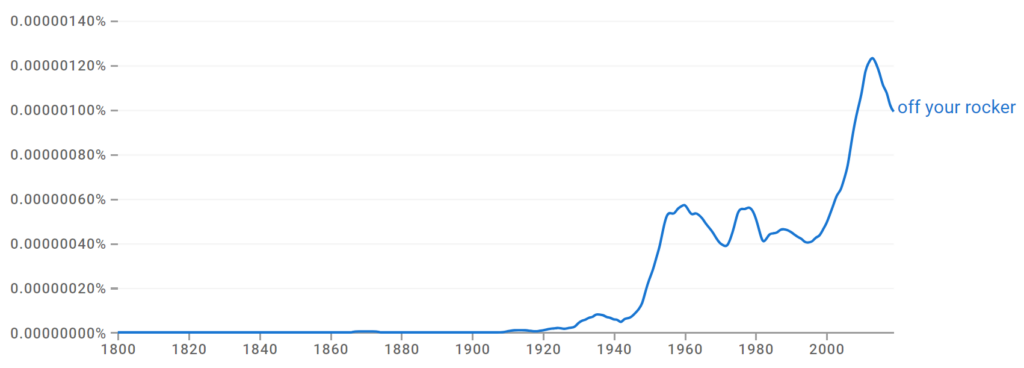Off your rocker means behaving in a strange or foolish way. We mostly use this idiom to suggest that someone is acting crazy or irrationally. Basically, it’s a colorful way to express the idea that someone’s not thinking clearly or is behaving oddly.
Idiomatic expressions such as off your rocker are groups of words with meanings that are different from the literal meanings of the individual words. They are used around the world and are important to the English language because they help us illustrate ideas and emotions we sometimes can’t put into words.
But guess what? Idioms like this one are only effective if used correctly. So, sit with me and learn the meaning, origins, and various uses of the idiom off your rocker with examples and helpful tips. You can use the quiz at the end to see how much you really understand about using this phrase!

What Does the Idiom Off Your Rocker Mean?
The idiom off your rocker means to be crazy or acting in a strange or irrational way. Merriam-Webster defines off your rocker as “having or showing a very abnormal or sick state of mind.” Moreover, the Cambridge Dictionary says, “If you say that someone is off their rocker, you mean that that person is behaving in a very strange or silly way.”
We typically use it to describe someone who’s acting in a bizarre or irrational manner that might not be how they normally act. It suggests that the person’s behavior is so unusual that it could be likened to falling off a rocking chair—a metaphor for losing one’s mental stability or sense.
I tell my husband he’s off his rocker on a daily basis. He has the world’s biggest imagination—which is probably why he’s such a great kid’s book author and illustrator—and is always coming up with ridiculous things to do or goals to aspire to.
Last year, he spent nearly six months wanting to start a hobby farm, knowing very well we would never have time for such a thing. Whenever he brought it up, I said, “I like cute animals, too! But you’re off your rocker if you think we’ll have a hobby farm in our rural backyard!”
Literal Meaning vs. Figurative Meaning
The literal meaning of off your rocker makes you think of someone physically falling off a rocking chair, which is funny because I witnessed my father fall off the rocking chair that we got him for Christmas one year! (It wasn’t fully assembled yet.)
But idioms aren’t meant to be literal, so in the figurative sense, the phrase is used to imply that someone’s not in their right mind or is acting in a way that defies common sense.
Variations of the Idiom
Certain variations of a common phrase come from its travels around the world. Regional dialects and cultural preferences sometimes reshape the wording of idioms, but the meaning always remains the same. Here are a few variances that you might hear out in the wild:
- Off his rocker
- Fallen off the rocker
- Off one’s rocker
- Off my rocker
- Off his trolley
How Is the Idiom Off Your Rocker Commonly Used in Context?
The idiom off your rocker is frequently used to describe situations where someone acts crazily or irrationally. Let’s explore the various ways this idiom is used in everyday language, discover tips for incorporating it effectively into our conversations, and find examples to illustrate its usage.
What Are the Different Ways to Use the Idiom Off Your Rocker?
- In a casual conversation: To make light of calling someone crazy. “He’s off his rocker if he thinks that plan will work!”
- To describe someone’s unusual idea: “She’s off her rocker for wanting to swim across the lake in winter.”
- In books or movies: To characterize eccentric or crazy characters. “Grandpa is off his rocker again, ranting about his superhero days.”
What Are Some Tips for Using the Idiom Off Your Rocker Effectively?
- Try to use it in informal and casual contexts because it’s a bit too harsh for a professional setting.
- Pair it with a description of the behavior that’s considered eccentric.
- Be mindful of the tone; it should only be used humorously or lightheartedly.
- It can be used as an insult, so only do so when you truly mean it as one.
Where Can You Find Examples of the Idiom Off Your Rocker?
This idiom has been used in modern literature, films, and various television shows—mostly in contexts where characters are portrayed as eccentric or having unconventional ideas.
Aside from the endless memes that utilize the expression, it’s the name of a 1980s comedy starring Milton Berle. It’s also the title of a rockabilly song by Brian Setzer.
The news and various media outlets have quoted the phrase, too, like in these examples:
Still, you don’t have to be off your rocker—which at times Jones seems to be—to scoff at Goodell’s reported contract demands of a $50 million salary and use of a private jet for life. (The Virginian-Pilot)
And if you told me Bryant would be a repeat guest on British talk radio critiquing Brexit plans, giving foreign trade advice and getting into the weeds on London and U.K. politics, why I’d be gobsmacked, and wonder if you were off your trolley. (The Clarion Ledger)
What Is the Origin of the Idiom Off Your Rocker?

The phrase off your rocker originated near the end of the 1800s and really picked up steam during the early 1900s to refer to those who were literally crazy. The rocker in this phrase refers to a rocking chair, with the metaphor suggesting losing balance or stability, similar to mental instability.
I’ve known people to say it because rocking chairs were used in asylums, and when a patient fell off, they’d say, “He fell off his rocker.” But there’s no hard proof of that, even though it makes sense.
How Did the Idiom Evolve Over Time?
It was originally used to describe eccentric behavior humorously, and the phrase has maintained its lighthearted connotation over time. It is still used in jest rather than as a serious accusation of insanity.
What Are Some Related Terms to Off Your Rocker?
Yes, there are tons of other lighthearted ways to call someone crazy. Use these synonyms to mix things up, and utilize the antonyms if you ever want to convey the opposite idea.

Synonyms
- Batty
- Bonkers
- Daft
- Nuts
- Berserk
- Irrational
- Lost one’s mind
- Loopy
Antonyms
- Sane
- Rational
- Level-headed
Off Your Rocker: Test Your Knowledge!
Choose the correct answer.
What Have We Learned about the Idiom Off Your Rocker?
Isn’t off your rocker a playful and vivid idiom? You can use it to describe eccentric or irrational behavior in pretty much any situation. Just be mindful that you’re not offending anyone. It’s really meant as a way to point out someone’s silly behavior, nothing more.
We covered all the details I could think of regarding its meaning, variations, origin, and examples. I hope you’re ready to start using this phrase correctly now.
If you feel like you learned a thing or two, be sure to check out my other idiom guides on our site! Happy learning!
Want to know more idioms? Here’s some of the articles we covered:
